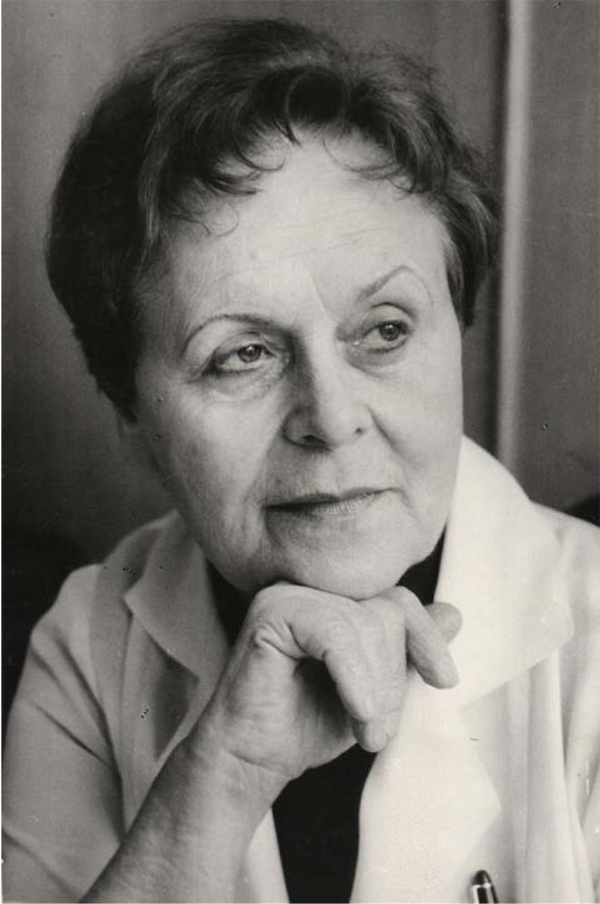J.ophthalmol.(Ukraine).2016;3:47.
|
https://doi.org/10.31288/oftalmolzh2016347
After a serious and extended disease, Lyudmila T. Kashintseva, MD, Professor, an ophthalmic surgeon and scientist, died on May 12, 2016. Her name is known in Ukraine and abroad, she was a member of European Glaucoma Society. She is an author of more than 300 scientific papers including two monographs, Basis of Ophthalmic Endocrinology (1977) and Ophthalmogeriatrics (1982) which have become the bible for ophthalmologists. She was a thesis advisor for 10 Candidates and 3 Doctors of Science (Medicine) in research areas headed by her. Lyudmila Kashintseva founded a young scientists’ school and educated a great number of researchers and clinicians specialized in glaucoma and ophthalmoendocrinology. She was born in the village of Ksaverovo, Gorodishchenskii district, Chernigov region, in the family of a peasant. In 1932 her family moved to Nikolaiev. That was also when she became a first-form pupil at school No 7. From 1939 she attended school No 15 and finished 9 forms in 1941. Not having the possibility for evacuation during the Great Patriotic War, she and her mother had to stay on the occupied territory in Nikolaiev. After Nikolaiev had been freed from fascists in March 1944, Lyudmila Kashintseva started working in Municipal Statistical Office as a regional inspector. At the same time she studied in 10th form of evening school. On graduating from secondary school with honors, she entered the General Medicine Department at Odessa Medical Institute which she finished with honors in 1950. Then she was accepted to clinical residency of the Filatov Institute of Eye Diseases and Tissue Therapy. Since 1952, she worked successively as a doctor-ophthalmologist and a junior researcher of Corneal Transplantation Department of the Filatov Institute. In 1958 she defended the dissertation for Candidate of Medical Science on Effect of Repeated Sterilization and Storage Duration of Tissue Preparations on Their Biological Activity and Therapeutic Efficacy. She was appointed to a position of a scientific secretary of the institute in 1960 and was given a title of a senior researcher of Glaucoma Department in 1964. In 1973 she chaired the Laboratory for Studying Glaucoma Pathogenesis. In 1972 Lyudmila Kashentseva defended the dissertation for Doctor of Medical Science on Glaucoma in Patients with Diabetes Mellitus (Pathogenesis, Clinic, and Treatment). Continuing the development of glaucoma issues, she founded a new trend in ophthalmology, ophthalmoendocrinology. She founded Ophthalmoendocrinology department, the only in the Soviet Union and in the world ophthalmic practice, and a special advanced course for practitioners across the country. From 1975 to 1991 she was a Deputy Director for Scientific work. She was awarded a title of Professor in Eye Diseases in 1983 and a title of Honored Worker of Science and Technology of Ukraine in 1986. Since 1991 she was a leading researcher of the Department of Glaucoma and Glaucoma Microsurgery Treatment. During her glorious path, Lyudmila Kashintseva was a deputy chairman of task group on Ophthalmology, All-Union task groups under the Academy of Medical Science on Ophthalmogeriatrics and Tissue Therapy in Geriatric Practice and on Vascular Pathology of the Eye, a chair person of All-Union and Republican scientific societies of ophthalmologists, a deputy chairman of Specialized Council of the Institute, a deputy editor-in-chief of Oftalmologicheskii Zhurnal. During her work at the Filatov Institute, Lyudmila Kashintseva developed current ophthalmic trends in glaucoma treatment in patients with Diabetes Mellitus, offered a new conception of open-angle glaucoma pathogenesis, and founded a new trend, ophthalmoendocrinology. In addition to fruitful clinical and surgical work, Professor Kashintseva was very interested in purely scientific questions. For a long time she had been working on glaucoma pathogenesis issue. She led scientific work and fundamental studies in this direction. Her view to glaucoma was rather large. Together with development of new surgeries, she was also interested in ultra structural changes in eye tissues, metabolism in glaucoma, and development of new methods for drug therapy of primary open-angle glaucoma. She considered glaucoma as a special manifestation of general vascular malformations. In addition to clinical topics in glaucoma, Professor Kashintseva headed scientific work on basic theoretical problems of cellular, receptor, and messenger mechanisms of regulation in glaucomatous process. That theoretical knowledge was the basis for innovative methods for primary glaucoma treatment. She was a thesis advisor for Candidates and Doctors of Medical Science in different issues of ophthalmology. Her tutees work in many medical institutions in Ukraine and abroad. Over a long period of her scientific work, she made a great number of presentations at scientific symposia and congresses. Lyudmila Kashintseva was a high-educated and and all-round person. She spoke foreign languages, loved and knew literature and music, and travelled a lot. Lyudmila Kashintseva was a person of kindness and wide sympathies, always ready to help. She loved and pitied patients, was not only a high professional, but a sensitive, caring healer of body and soul for the patient. She was of unquestioned authority and respect among colleagues. For significant contribution to the development of domestic ophthalmology, Ludmila Kashintseva was awarded high state awards: Order of Friendship of Peoples, Order of the Badge of Honour, Medal For Valiant Labour, Badge for Excellence in Health Care, and numerous diplomas and certificates of the Academy of Medical Sciences and Ministry of Health of Ukraine.
The bright memory of Lyudmila Kashintseva will remain forever in the hearts of her friends, colleagues and students.
|

 In the Memory of Professor Lyudmila T. Kashintseva
In the Memory of Professor Lyudmila T. Kashintseva